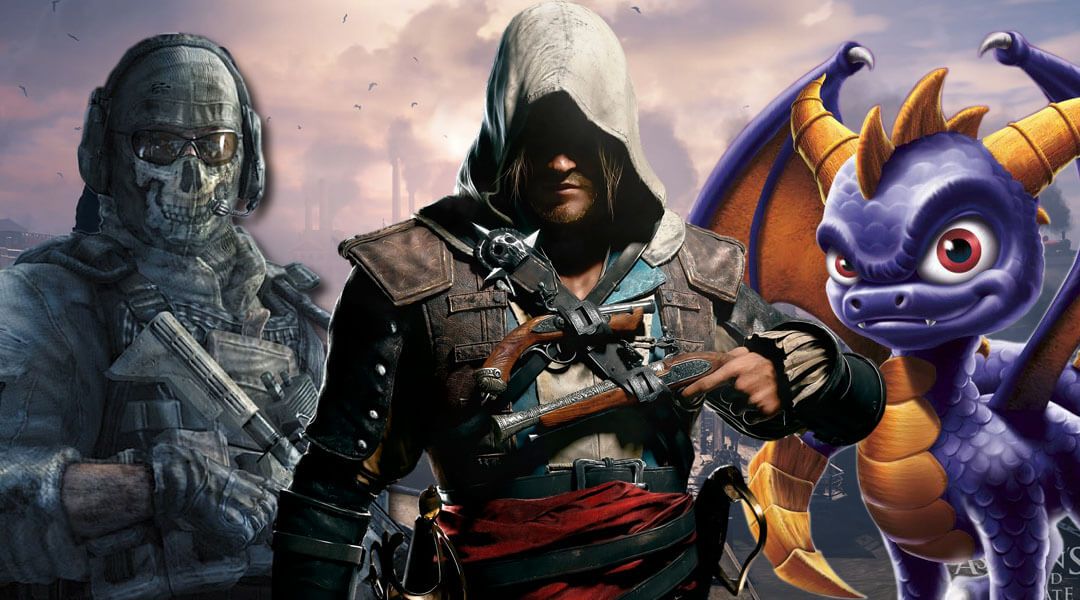As gamers are bombarded with existing franchise installments year after year, one author reflects on how important it is for companies to pace their annual releases.
Anytime I think about the gaming industry, I'm forced to look at what it was like when it first peaked my interest. Mascot-centric platformers littered the landscape, that much is true, but there was something different about each and every one of them. It was truly an era of trial and error, with many casualties along the way. The gaming industry has grown substantially since this time, quickly becoming a multi-billion dollar industry chockfull of big franchises with even bigger expenses. As a result, the gamble to make it big has become a lot more substantial – understandably forcing companies to stick with what they know works.
In this time, Call of Duty, Assassin's Creed, Skylanders, Disney Infinity, and annual sports titles reign supreme, but they're accompanied by scrutiny from vocal consumers with each and every release. Claims that each new iteration feels too similar are understandable when the brand name lands repeatedly, and it's gotten to the point that those that were once intrigued have become annoyed by any news that's generated from any of the aforementioned games.
Admittedly, anger towards the likes of Disney Infinity and Skylanders tends to be directed at the fact that the games are pay-to-play, thanks entirely to the various sets of action figures that are necessary for the software to function. The others, however, have begun lessening the power of their respective licenses through all too familiar release patterns, which brings up the most crucial point of all – franchise pacing is stupidly important.
I'm not just siding with the likes of the vocal masses either, because there's a funny thing happening to annual games – their sales are starting to drop dramatically. Call of Duty in particular has seen a dip in sales for every new installment it has released since Call of Duty: Modern Warfare 3 before Black Ops 3 arrived on the scene, and I'm talking about millions of units separating each new entry. Admittedly, sales for the recently released Black Ops 3 have yet to be formally unveiled, but the sell through is said to have "rose significantly over the previous two years" – the most recent of the two being a game that was outsold by the critically-lampooned Call of Duty: Ghosts.
Despite being up over the previous two releases, it's still an incredibly troubling development for Activision, a company that has three studios on tap (Sledgehammer Games, Infinity Ward, and Treyarch) that are each responsible for cranking out a brand new entry within a three-year development cycle. Despite selling poorly for a Call of Duty game, Activision is still making hand-over-fist with every release – it is one of the biggest franchises in gaming, after all – but that won't always be the case if the firm remains steadfast on pushing its annual release plans.
Assassin's Creed isn't immune to this trend either, as the latest iteration, Syndicate, has sold slower than Ubisoft had hoped. The company blames this less than ideal sales slip on 2014's Assassin's Creed Unity, which released under immediate scrutiny for its lack of playable female characters and then launched as an unfinished and glitchy mess in the eyes of dedicated gamers and critics alike. The end result has undoubtedly hurt the series, but it appears that Ubi execs could be looking to restore balance to its powerhouse franchise.
While the property will be very present during 2016, with both a live action film and the digital-only Assassin's Creed Chronicles: India, there are rumors circulating that the main series may be skipping 2016 altogether. This would be a great time to do it, as fans will have plenty of other things to grab their attention during an off year, and it ensures that fan demand can be built up by the time it finally lands in 2017. Of course, Ubisoft has previously stated that Assassin's Creed missing a year "would be stupid," so only time will tell whether or not the company is sticking to those (potentially) premature claims in the coming months.
At the end of the day, the truth is that there just isn't nearly as much excitement surrounding the games, which is why no one is overly shocked by the grand reveal of a new iteration. It has become expected from consumers at this point, and that's one of the tragic aspects about an annual release pattern. Comparatively, when the likes of a new Fallout or Grand Theft Auto are revealed, fans go absolutely crazy. It's not that anyone dared to think that either franchise would never see another iteration – that would be absurd – but we get excited because we didn't have the faintest idea in regards to when they would be coming. That's what annual releases lack – excitement.
Activision, Ubisoft, Electronic Arts, and all of the other repeat offenders have drained the anticipation of each new installment in their biggest properties, and that's a real shame with serious financial repercussions in the longterm that have already begun making themselves apparent. If I can suggest anything to these companies, it's this: Take some time to readjust, reinvent, and reassess the annual release plan, because myself and many other gamers want more than ever to finally be excited for a new Call of Duty or Assassin's Creed. Otherwise, these blockbusters will continue to see sales fall into obscurity, and no one wants that happen.

